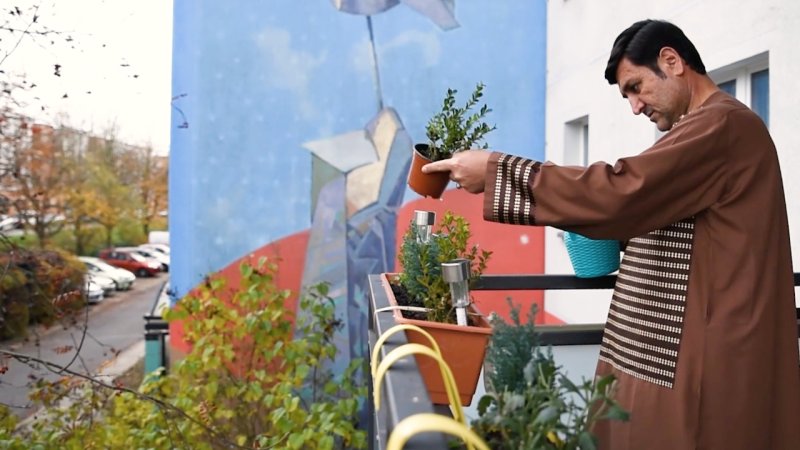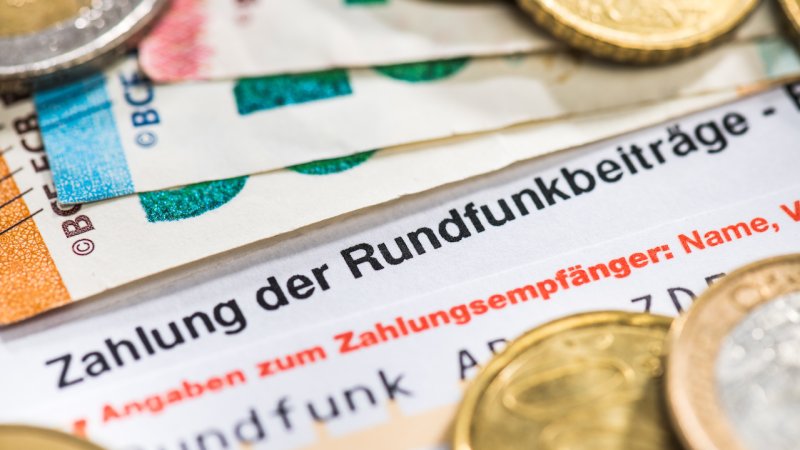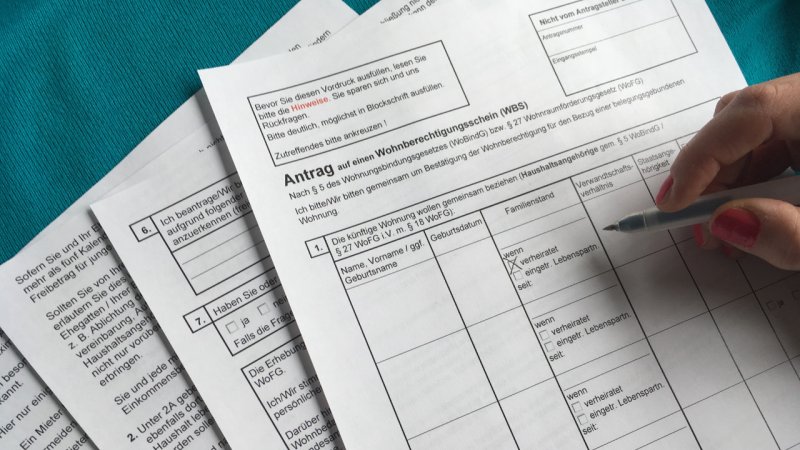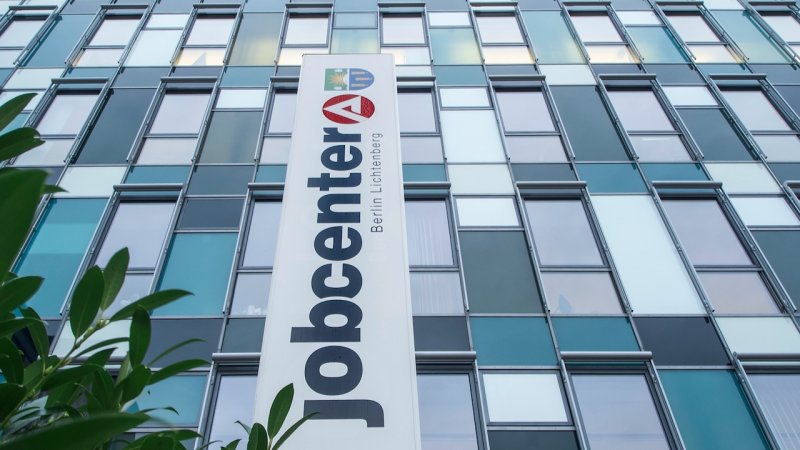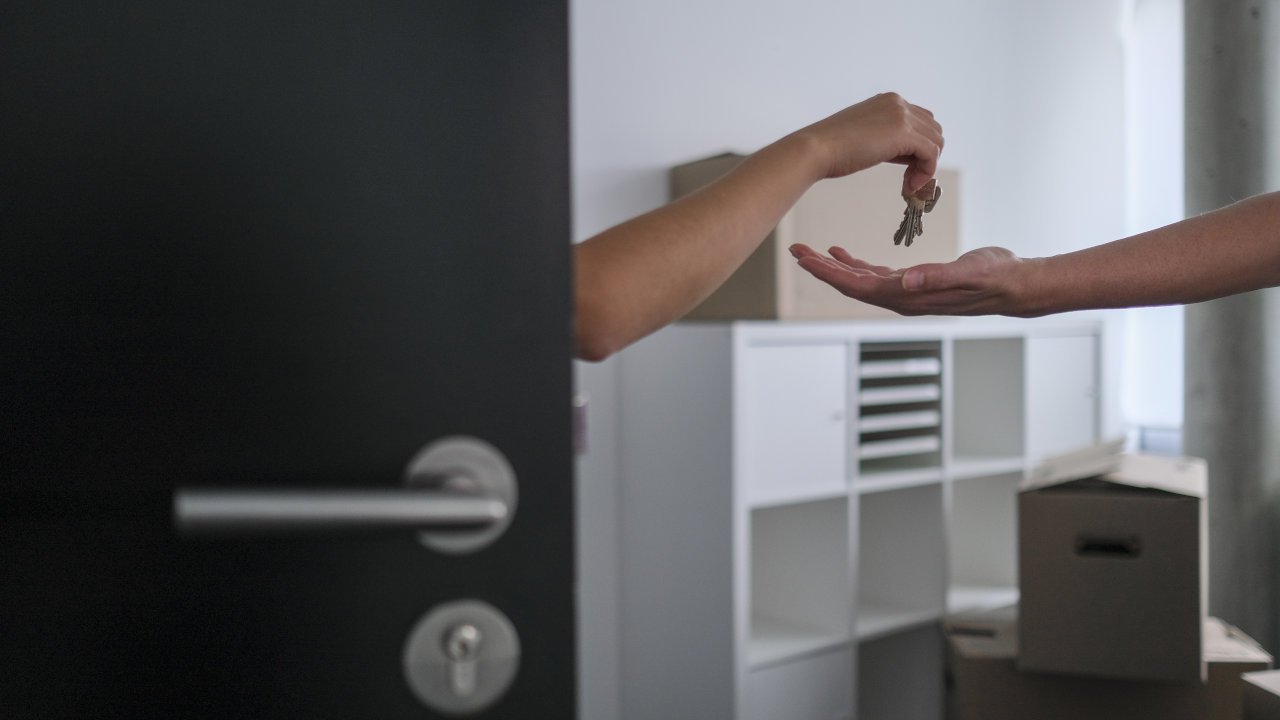
Finding a new flat is challenging in many German cities. When you finally find a flat, there is much to sort out. For example, you must inspect the tenancy agreement, register for electricity and internet services and plan the move. Here, you can find out what you need to look out for. There is a checklist at the end of the page to help you plan everything in advance.
Have you been accepted as a new tenant? Congratulation! You must undoubtedly be pleased: It often takes months to find a new home. Now, it is crucial to plan the next steps carefully. Whether you are moving into a flat, a shared flat, or a short-term rental plays a significant role here. You need to pay attention to various issues. You can find more information on shared flats (WG) and temporary rentals on our page ‘Types of housing - What types of housing are there?’.
Before you move into your new flat, you must sign the tenancy agreement. Have a close look at the flat beforehand. This way, the official handover (when you receive the keys to your new flat or room) will be as stress-free as possible.
In the weeks before you move in, you will have a lot of things to do. You will need to look for furniture and perhaps renovate the flat. You will also need a telephone and internet provider and have to organise the move. Don't forget to forward your post to the new address.
After handing over the flat, you will need to find an electricity and possibly a gas supplier and register your new address with various authorities. You also need to register for the TV licence fee - you can find all the essential information on our ‘TV Licence fee’ page.
You can find more information on the individual steps in the following sections. A checklist at the end of this page briefly summarises the most important points.
There is a distinction between net or cold rent (Netto- oder Kaltmiete) and gross or warm rent (Brutto- oder Warmmiete). The net rent only covers the costs of the flat. However, there are also the operating or ancillary costs, which include water costs, trash collection, and often also heating costs and similar operating costs. The gross or warm rent is, therefore, the figure that matters, as it is the amount you actually have to pay. The rental costs must be itemised in the rental agreement. You can learn more about it on our page, ‘Tenancy agreement’.
Good to know: These costs do not include your electricity costs. The same applies to gas costs, too, sometimes, if gas is used for cooking and/or heating in your new home. You must take out an electricity contract and possibly a gas contract yourself and pay additional costs. The same applies to telephone and internet service. You can learn more about it in the sections ‘How do I find a gas and electricity provider?’ and ‘How do I find a telephone and internet provider?’.
If you receive benefits from the Social Welfare Office or Jobcenter, you must clarify things with them before looking for accommodation. They will only cover a certain amount of rent if specific rules are met. You need written confirmation from the authorities that you are authorised to look for your own flat. Ask your caseworker how high the rent may be and what conditions the flat must fulfil. The permitted rent amount can vary from city to city. It depends on things like the type of heating and the size of the building. The flat cannot be smaller than a specific size and must not be too large. Many authorities do not accept fixed-term tenancy agreements or contracts with gradually increasing rent (so-called “Staffelmiete”). Therefore, ask in advance about the exact rules and regulations that apply.
Good to know: “Staffelmiete” or graduated rent is a particular type of rent. It means that it is stipulated from the outset that the rent will be increased regularly. The contract states precisely when and by how much the rent will increase, for example, by a certain amount every year. This means that tenants and landlords know from the outset how the rent will rise over time.
If you have been accepted as a tenant for a flat, ask the landlord for a rental offer. This offer must contain all the essential information about the flat and the landlord's telephone number. Many state offices have specially designated forms for this that you can give the landlord. Ask your caseworker for such a form. Once the landlord has completed the form, take it to your caseworker as soon as possible. They will check the offer and confirm that the costs will be covered. With this confirmation, you can go back to the landlord and sign the tenancy agreement.
Please note: If you are in Germany on a visa to work, study or go through vocational training, you will not usually receive financial assistance. If you have problems paying your rent, seek advice. We can help you find an advice centre. Simply register in our free and anonymous community forum and seek help.
A rental deposit is there to provide the landlords with financial protection. If the tenant does not pay the rent or damage something in the flat, landlords can withhold the deposit. The deposit may not exceed 3 net rents and must be paid by the time you move in at the latest. The exact rules and further details are explained on our page Rental Contract.
Finding a flat in Germany can be very challenging - so you'll be all the happier when you get one. But don't forget to check the rental contract carefully before you sign it. The tenancy agreement or rental contract is a legally binding agreement between the tenant and the landlord. It regulates, for example, how the rent is made up and how much deposit you have to pay before moving in. You can find out what you should consider on our Rental Contract page.
Before you move into your new flat or shared flat (WG), have a close look at the rooms. Look out for damage, such as cracks in tiles, stains on the carpet or scratches on kitchen cupboards if there is a fitted kitchen. Landlords are not obliged to repair such minor defects or ‘blemishes’. However, you should record them in a handover report and have the landlord sign it before you move in. This is important so that you are not held responsible when you move out of the flat.
Also, check that all windows close correctly, that the taps are working, that there’s hot water and that all sockets and the toilet are functioning.
Good to know: The handover protocol is usually drawn up when the flat is handed over. The meter readings for electricity and, if applicable, gas are also recorded in the protocol. The consumer advice centre has compiled tips for the handover protocol that you can use.
Please note: Major defects such as mould in the living space, damp walls, broken windows or heating systems must be rectified by the landlord. You should also record such defects before moving in.
Don't forget: Reserve a removal van in good time and apply for a no-parking zone or “Haltverbot” for the day of the move. A so-called “Haltverbot” ensures that there is enough space for the transport vehicles, especially if the street you are moving into has few parking spaces. You must apply to the ‘road traffic authority’ (“Straßenverkehrsbehörde”) responsible for you. The application takes at least four weeks to process, so submit it as early as possible.
The handover takes place a few days before the move or, at the latest, on the day you move in. You will walk through the flat with the landlord or someone from the property management company and note any defects in the handover report. You will also receive the keys to the flat on this day. The handover of keys should, therefore, always take place in person.
If the flat is not furnished and you are not moving into a room in a shared flat, the place should be completely empty so that you can see any possible damage better.
Good to know: Possible defects are noted in a handover protocol so that you are not held responsible when you move out of the flat later. You will receive at least one set of keys for the flat. The number of keys handed over is also recorded in the handover protocol.
Finally, the meter readings for electricity and, if applicable, gas are also recorded at the handover. You must report this information to your electricity provider and, if applicable, your gas provider.
The consumer advice centre has compiled brief tips for the handover protocol you can use.
Electricity is not included in the rent, so you have to pay for electricity in addition to the rent. That means you have to register with an electricity provider yourself. It is worth comparing different offers to find the most favourable tariff for you. Tariff calculators such as Check24 can help here. Once you have found an electricity provider, you can register online. The electricity provider will also ask you for the current status of your electricity meter when you register. You will find this meter reading on the handover report that you received from the landlord or property manager when you were handed over the property.
If you cook or heat with gas, you may also have to register with a gas supplier yourself. Your landlord will inform you if that is the case. The registration process is the same as the one you require for electricity. You can find a tariff calculator for gas providers on Check24.
Good to know: As long as you have not concluded a contract with an electricity or gas provider, the so-called “basic supply” (“Grundversorgung”) is automatically activated. This means you will have electricity and gas immediately after moving in without signing a contract beforehand. The basic supply is provided by the local supplier, for instance, ‘Stadtwerke’. The basic supply is usually more expensive than other tariffs, so it is worth taking out a contract with a different tariff as soon as possible.
Please note: Your electricity supplier (and possibly also your gas supplier) will debit a fixed amount from your account each month. This is an estimated amount. This means that your actual electricity consumption will be checked once a year. You will then either receive money back or have to pay additional money– depending on whether you have used less or more electricity than estimated. To check your actual consumption, your electricity supplier will contact you and ask you for the current status of your electricity meter. The same applies to your gas supplier if you use gas in your home.
The costs for telephone and internet services are not included in the rent. This might be different if you are moving into a shared flat: Then there is most likely already a telephone and internet contract, and you can clarify with your new flatmates how much your share of the costs will be.
However, if you move into a flat or start a new shared flat, you must register with a telephone and internet provider. It's worth comparing different offers to find the package that suits you best. Tariff calculators such as Check24 can provide a helpful overview. It may also be worth asking the provider of your mobile phone contract: if they also offer telephone and Internet services, you may be able to get a cheaper overall package.
Please note: The lower the price of your telephone and Internet services, the longer you are often tied to your provider. Check the contract terms carefully before signing.
If you want to make sure that you don't miss any letters, you can place a forwarding order (“Nachsendeauftrag”) with Deutsche Post and Pin Mail AG for a certain period. However, you will have to pay for this service.
Also, remember to label the doorplate, letterbox and doorbell of your new flat with your name - in some flats, the property management will do it for you so that the doorbells and letterboxes in the building look uniform. It is best to ask about this during the flat handover.
Once you have moved, you must register your new place of residence with your local Registration Office (“Einwohnermeldeamt”). This office is often also called the “Bürgeramt” or “Bürgerbüro”. You can find out everything you need to know about registration on our page “Registering and deregistering your place of residence”.
You should also inform the Immigration Office of your new address as soon as possible. Also, inform all other important offices with which you need to remain in contact. These include, for example, the Jobcenter, Social Welfare Office, Tax Office, your bank, your employer and your insurance companies.
After moving house, you must register for the TV licence fee. If you are moving into a shared flat, the flat may already be registered, and you will only pay part of the licence fee. You can find out how to register, what deadlines there are and how you can be exempted from paying the licence fee on our page, “TV licence fee”.
You can find affordable furniture in so-called ‘second-hand department stores’ or in ‘social department stores’ (“Gebrauchtwarenhäusern” or “Sozialkaufhaus”). These are department stores where used furniture, crockery, electrical appliances, clothes or toys, as well as books and CDs, are sold. The items are usually donations from people who no longer need them. Many department stores are run by social associations or non-profit organisations. To find such a department store nearby, enter ‘Sozialkaufhaus’’ and the name of your place of residence in the search bar.
You can often find second-hand furniture and other household items at flea markets or in a “Trödelmärkt”. You can learn more about them on our topic page ‘Flea markets’.
There are various online platforms where people sell or give away their second-hand furniture or other household items. One example is ebay Kleinanzeigen. In the “zu verschenken” section, you will find things that other people are giving away for free. You can filter the section according to your local area. Sometimes, you need an account to contact the sellers, but creating an account is cost-free.
When you move into a flat, you may want to take out liability and household insurance. These insurances are voluntary but cover you against financial risks. You can find everything you need to know about these two voluntary insurances on our ‘Supplementary Insurance’ page.
Checking out the rental contract, finding an electricity and internet provider, organising the move: There's much to do after you've been promised a flat. The following checklist summarises the most important items:
Immediately after the flat commitment:
- Check out your rental contract thoroughly before you sign it.
- Clarify how you will pay the rent - especially if you receive financial support from the Social Welfare Office or Jobcenter for the rental costs.
One to two months before you move in
- Take out a telephone and internet contract.
- Look for furniture for your new home if you are not moving into a furnished flat. There are a few tips in the ‘Where can I find affordable furniture?’ section.
- Set a moving date and, if necessary, apply for a no-stopping zone (“Halteverbotszone”) for the day of the move.
One week before the move
- One week before the move (at the latest on the day of moving in), the flat and key handover should take place. The meter readings for electricity and, if applicable, gas will also be taken at this time. You can find more information on this in the section ‘What should I look out for before moving in?’.
- After the meter readings have been recorded, look for an electricity provider and, if necessary, a gas provider.
- Transfer the deposit for your new flat or shared room after signing the rental contract, but no later than when you move in.
After moving in
- Register for the TV licence fee. You can find more information on our topic page, ‘Broadcasting licence fee’.
- Register your new place of residence with your local registration office (often also the “Einwohnermeldeamt”, “Bürgeramt”, or “Bürgerbüro”). Find out more here on our topic page, ‘Registering your place of residence’.
- Inform all necessary authorities about your new address. This includes, in particular, the Immigration Office, your health insurance company, your bank and, if you work, your employer.
If you have problems with your landlord or neighbours, you can seek help from a tenants‘ association or tenants’ union. These organisations can provide you with advice and legal support. You have to become a member and pay around €50 a year. You can find a tenants' association near you at mieterbund.de.
If you have problems with your service charges, electricity or gas bills, you can also ask the consumer advice centre or “Verbraucherzentrale” for help.
If you are being discriminated against by landlords or neighbours, you can contact the anti-discrimination office. You can find a counselling centre near you at antidiskriminierungsstelle.de. You can learn more about this topic on our topic page, ‘Discrimination’.
Tenants in Germany are well protected by law. If you have problems with your landlord, contact an advice centre for tenants. These special counselling centres are usually called “Mieterschutzbund” or “Mieterverein”. The staff there will help you with any difficulties and support you in disputes with landlords.
